第二册lesson2 Breakfast or lunch课件(共31张PPT)
文档属性
| 名称 | 第二册lesson2 Breakfast or lunch课件(共31张PPT) | 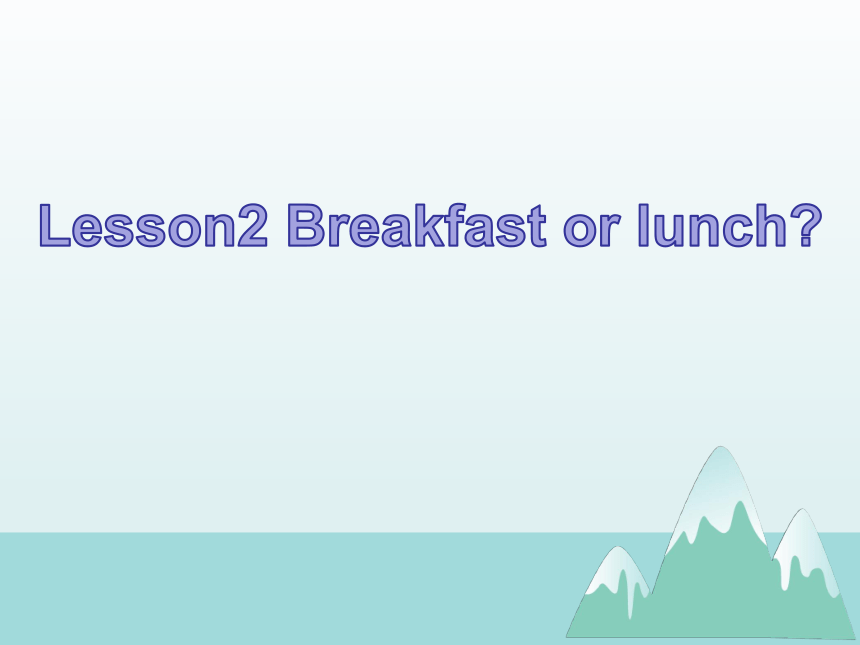 | |
| 格式 | pptx | ||
| 文件大小 | 2.9MB | ||
| 资源类型 | 教案 | ||
| 版本资源 | 新概念英语 | ||
| 科目 | 英语 | ||
| 更新时间 | 2025-01-02 12:52:15 | ||
图片预览

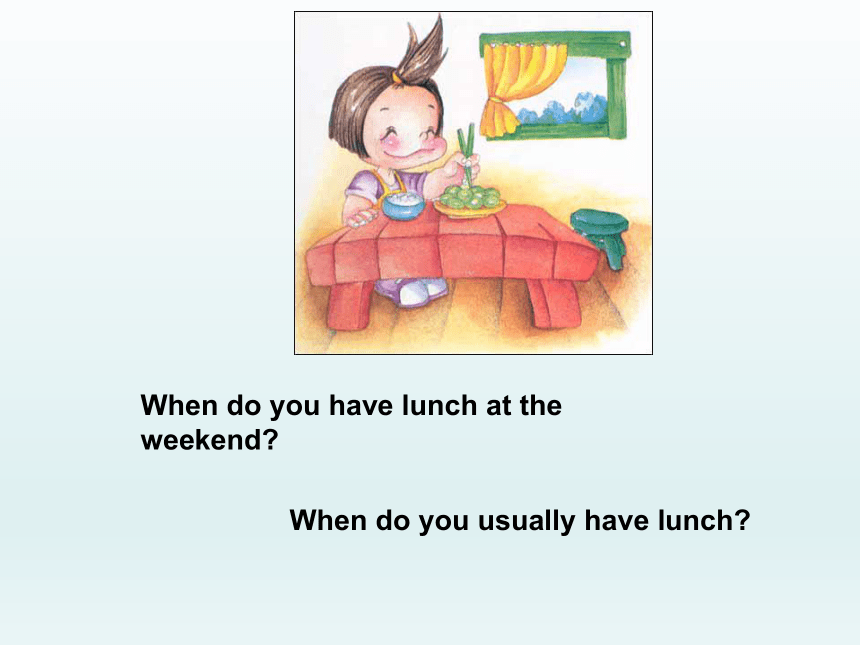
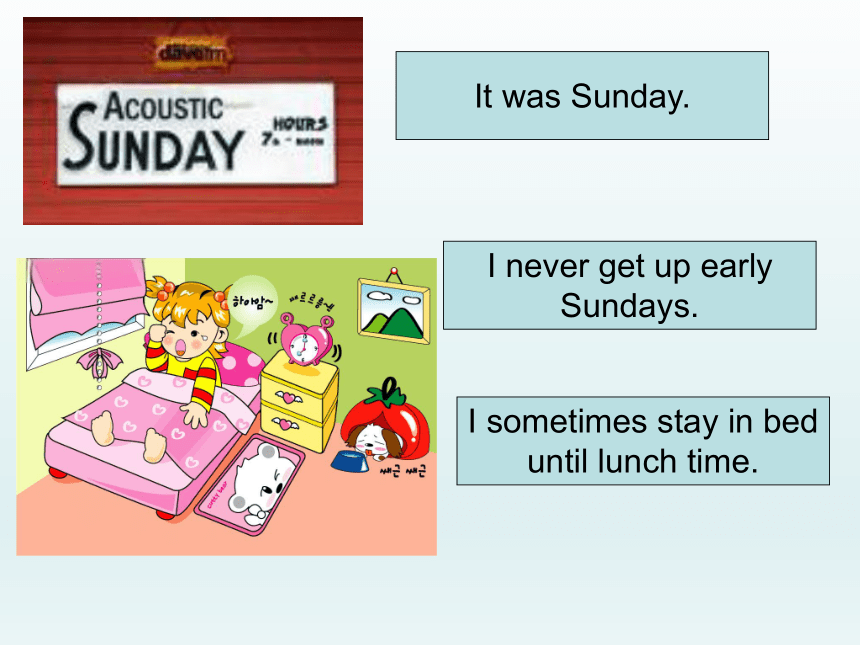
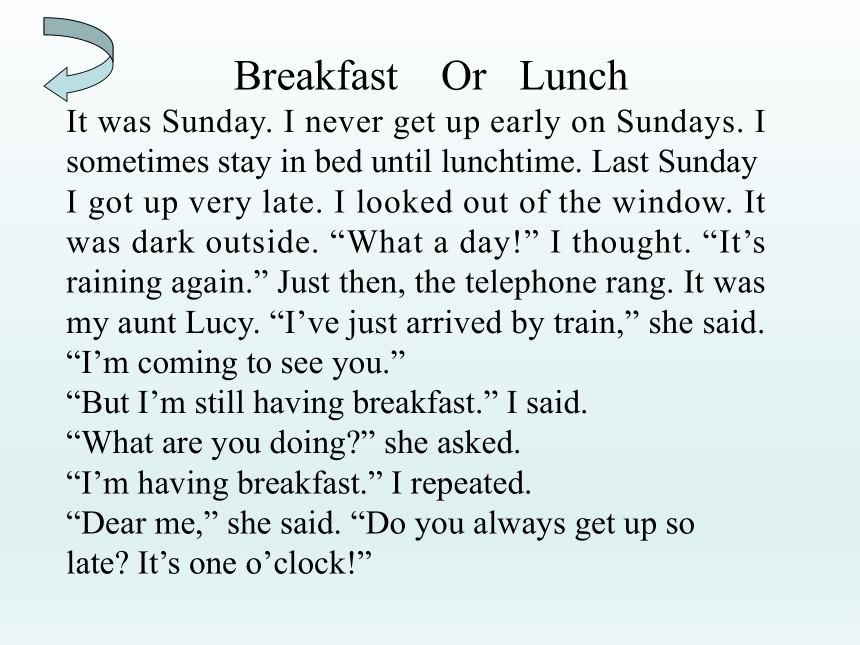
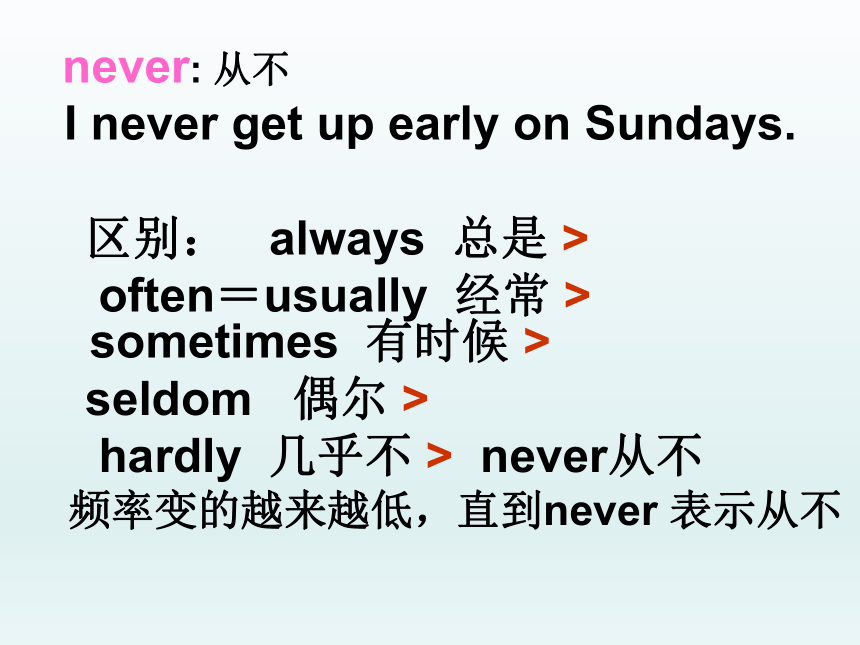
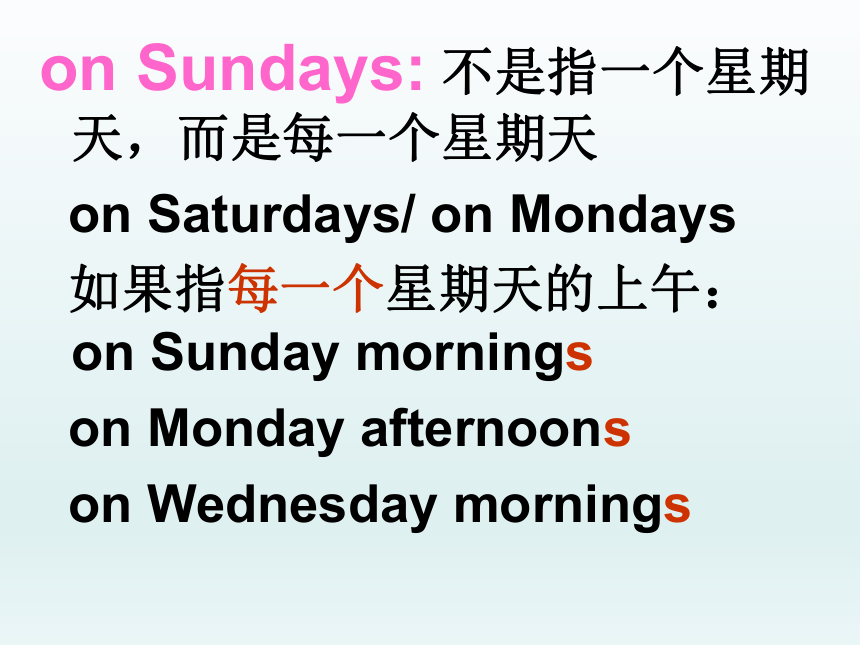
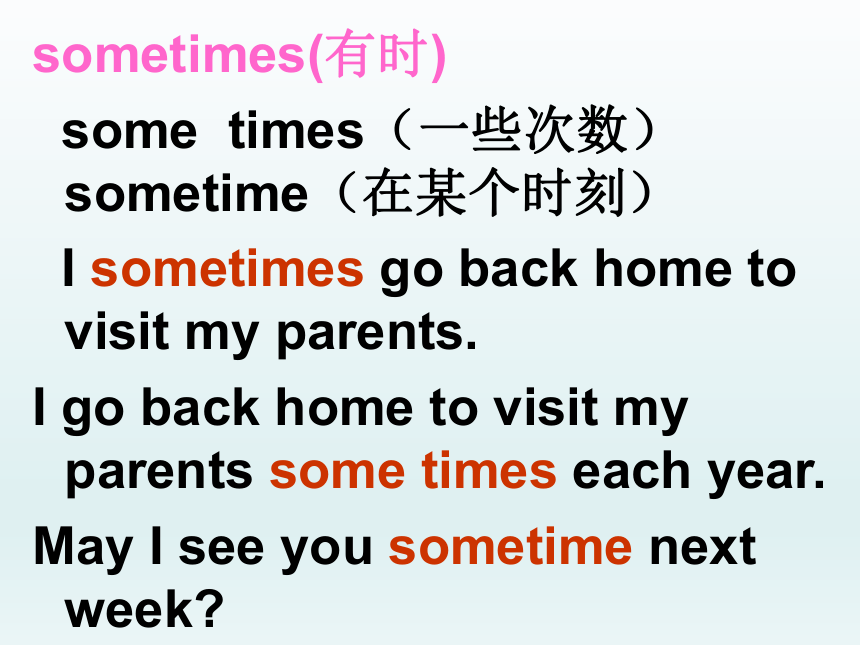

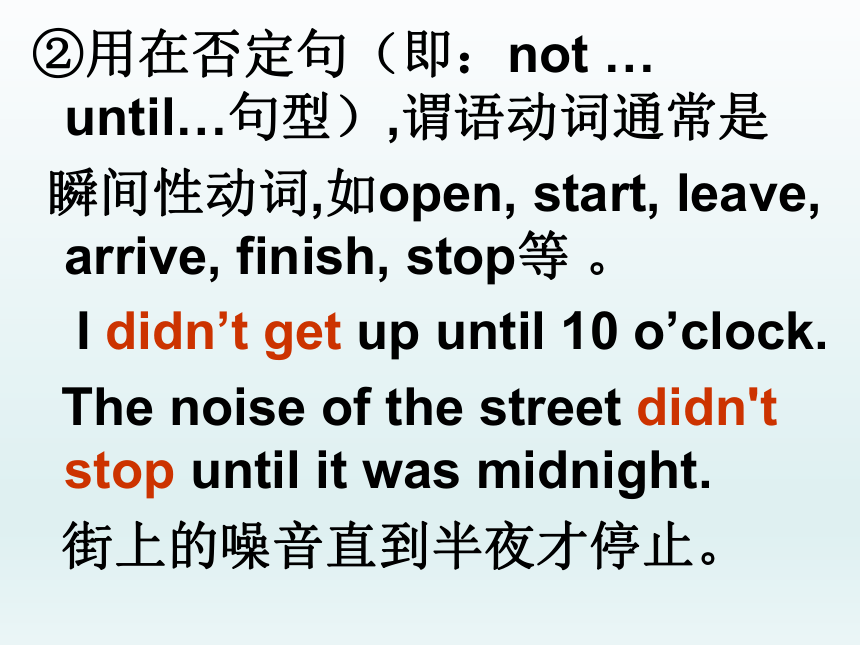
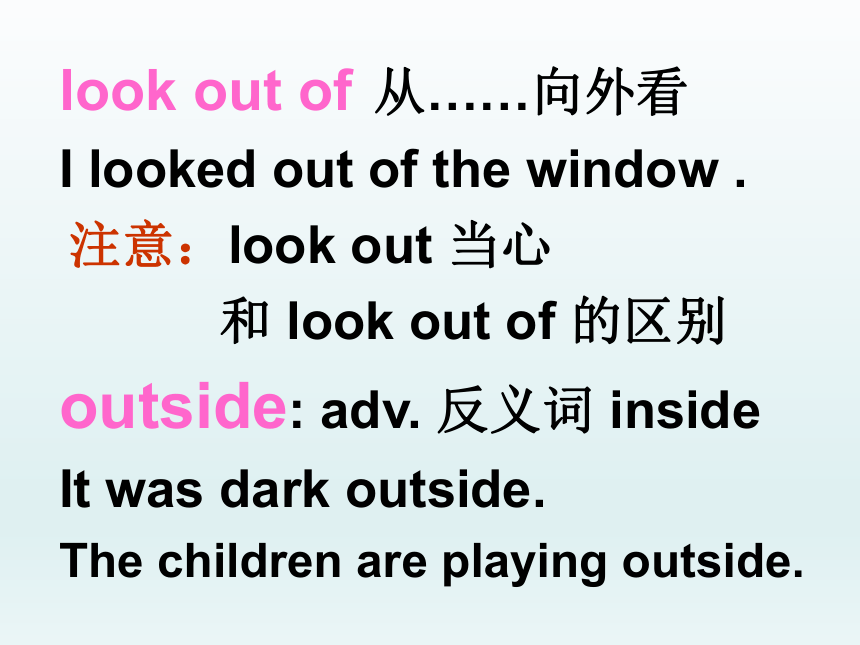
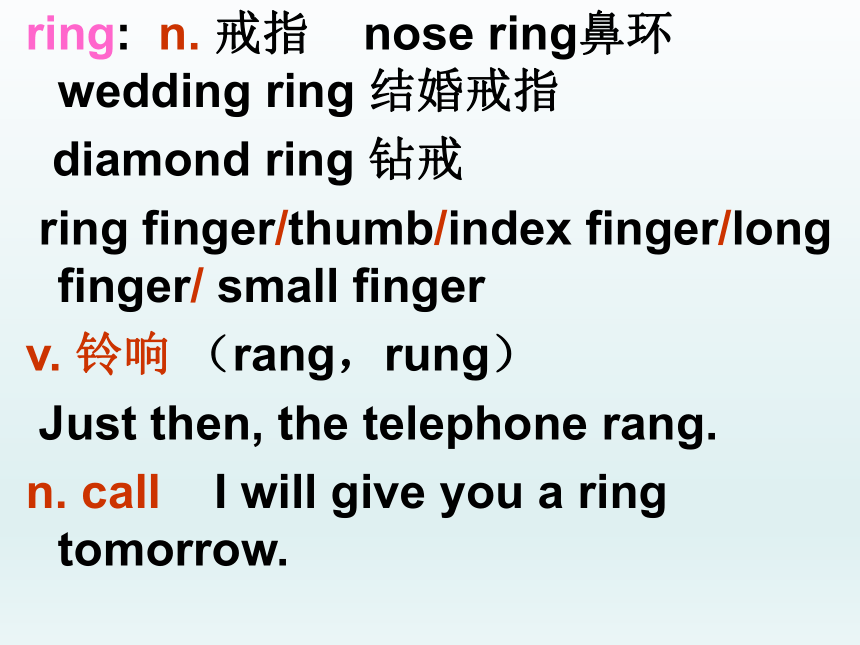
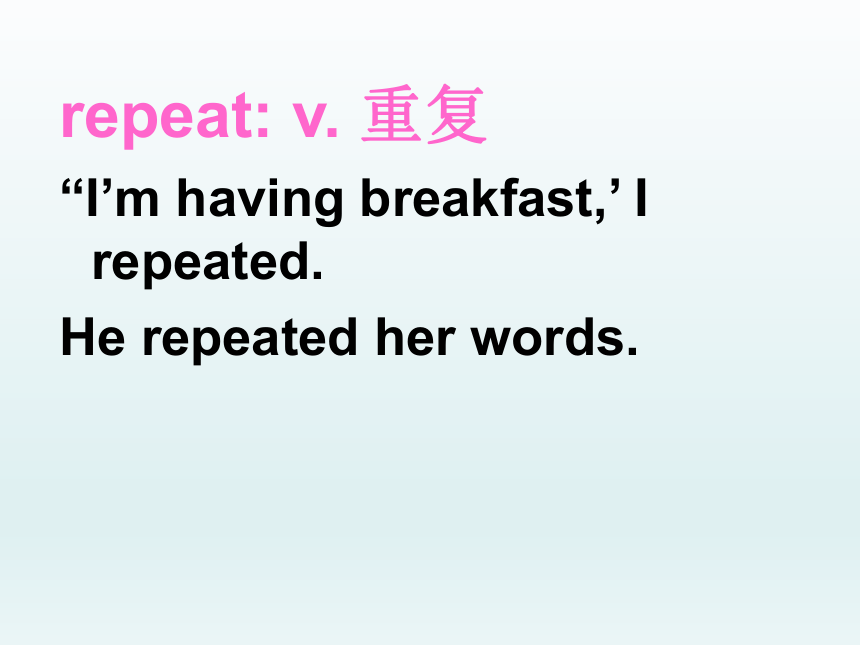
文档简介
(共31张PPT)
Lesson2 Breakfast or lunch
When do you usually have lunch
When do you have lunch at the weekend
It was Sunday.
I never get up early
Sundays.
I sometimes stay in bed
until lunch time.
Breakfast Or Lunch
It was Sunday. I never get up early on Sundays. I sometimes stay in bed until lunchtime. Last Sunday I got up very late. I looked out of the window. It was dark outside. “What a day!” I thought. “It’s raining again.” Just then, the telephone rang. It was my aunt Lucy. “I’ve just arrived by train,” she said. “I’m coming to see you.”
“But I’m still having breakfast.” I said.
“What are you doing ” she asked.
“I’m having breakfast.” I repeated.
“Dear me,” she said. “Do you always get up so late It’s one o’clock!”
never: 从不
I never get up early on Sundays.
区别: always 总是 >
often=usually 经常 > sometimes 有时候 >
seldom 偶尔 >
hardly 几乎不 > never从不
频率变的越来越低,直到never 表示从不
on Sundays: 不是指一个星期天,而是每一个星期天
on Saturdays/ on Mondays
如果指每一个星期天的上午: on Sunday mornings
on Monday afternoons
on Wednesday mornings
sometimes(有时)
some times(一些次数) sometime(在某个时刻)
I sometimes go back home to visit my parents.
I go back home to visit my parents some times each year.
May I see you sometime next week
until(直到)
①用在肯定句,谓语动词通常是延续性动词,如stand, stay, talk, wait 。
I sometimes stay in bed until lunchtime.
I waited until he came back. 我一直等到他回来。
②用在否定句(即:not … until…句型),谓语动词通常是
瞬间性动词,如open, start, leave, arrive, finish, stop等 。
I didn’t get up until 10 o’clock.
The noise of the street didn't stop until it was midnight.
街上的噪音直到半夜才停止。
look out of 从……向外看
I looked out of the window .
注意:look out 当心
和 look out of 的区别
outside: adv. 反义词 inside
It was dark outside.
The children are playing outside.
ring: n. 戒指 nose ring鼻环 wedding ring 结婚戒指
diamond ring 钻戒
ring finger/thumb/index finger/long finger/ small finger
v. 铃响 (rang,rung)
Just then, the telephone rang.
n. call I will give you a ring tomorrow.
repeat: v. 重复
“I’m having breakfast,’ I repeated.
He repeated her words.
repeatv重复
拆分:r +e +p+eat
联想:人重复要鹅拿斧子吃东西。
What a day!
What a bad day!
How bad a day!
How bad the day is!
感叹句通常有what, how引导,表示赞美、惊叹、喜 悦、等感情。
Grammar
How引导的感叹句:
How + 形容词 + 主 + 谓 + ··· !
How clever the boy is !
How funny the elephant is!
How + 形容词+a / an+ 名词 +主 +谓 + ··· !
How clever a boy he is !
How funny an elephant it is !
How +副词 +主 + 谓 + ··· !
How fast she runs !
How hard the girls are working !
What引导的感叹句:
What +a / an+ 形容词 + 可数名单+ 主 + 谓··· !
What a clever boy he is!
What an funny elephant it is!
What + 形容词 + 可数名复 + 主 + 谓+··· !
What clever boys they are !
What funny elephants they are!
What + 形容词 + 不可数名 + 主 + 谓+ ··· !
what cold water it is !
What delicious milk it is !
1.
It was
Sunday
2.
I
early on
never get up
Sundays
3.
I
in
until
sometimes stay
bed
lunchtime
4.
I
very
Last Sunday
got up
late
.
.
.
.
1.
I
looked out of
the window.
2.
It was
outside.
dark
3.
“What
!” I
a day
thought.
4.
“It’s
again.”
raining
5.
Just then,
the telephone
rang.
6.
It was my
Lucy.
aunt
7.
“I’ve just
by
,” she
arrived
train
said.
1.
“But I’m still
” I
having breakfast.
said.
2.
“What are you
” she
doing
asked.
3.“I’m
” I
having breakfast.
repeated.
4.“
,” she
Dear me
said.
5.“Do you always
so
get up
late
6. “It’s
one o’clock!”
早餐还是午餐
那是星期六,而星期六我是从来不起早的。有时我要一直睡到吃午饭的时候。上个星期六,我起得很晚,我看看窗外,外面一片昏暗。“鬼天气!又要下雨了。”我想。正在这时,电话响了。是我妈妈打来的。她说:“我刚下旅游车touring bus,我这就来看你。”
“但我,我还在吃早饭呀。”我说。
“你还在干什么?”我妈问。
“我正在吃早饭。”我重复说。
“天啊,你这懒虫you lazy boy or you are lazy boy,你总是起得这么迟吗?现在就都下午一点多了!”
.句型练习( pattern drills)
1. T:John’s sleeping
S1:Where’s John He’s late.
S2:I expect he’s still sleeping.
Mrs.Smith’s cooking
Tom’s getting ready
2. T:clean the car---Sunday
S1:Why are you cleaning the car now
S2:Because it’s Sunday. I always clean the car on Sunday.
play football /tennis—Wednesday
write to John/Mary--Thursday
3.T:drive very fast
S1:He’s driving very fast these days,I see.
S2:No,no,you’re wrong. He doesn’t usually drive very fast.
drink heavily
work hard
4. T:rude people
S1:What rude people!
S2:Yes,they are rude,aren’t they!
an ugly woman
wonderful actors
Lesson2 Breakfast or lunch
When do you usually have lunch
When do you have lunch at the weekend
It was Sunday.
I never get up early
Sundays.
I sometimes stay in bed
until lunch time.
Breakfast Or Lunch
It was Sunday. I never get up early on Sundays. I sometimes stay in bed until lunchtime. Last Sunday I got up very late. I looked out of the window. It was dark outside. “What a day!” I thought. “It’s raining again.” Just then, the telephone rang. It was my aunt Lucy. “I’ve just arrived by train,” she said. “I’m coming to see you.”
“But I’m still having breakfast.” I said.
“What are you doing ” she asked.
“I’m having breakfast.” I repeated.
“Dear me,” she said. “Do you always get up so late It’s one o’clock!”
never: 从不
I never get up early on Sundays.
区别: always 总是 >
often=usually 经常 > sometimes 有时候 >
seldom 偶尔 >
hardly 几乎不 > never从不
频率变的越来越低,直到never 表示从不
on Sundays: 不是指一个星期天,而是每一个星期天
on Saturdays/ on Mondays
如果指每一个星期天的上午: on Sunday mornings
on Monday afternoons
on Wednesday mornings
sometimes(有时)
some times(一些次数) sometime(在某个时刻)
I sometimes go back home to visit my parents.
I go back home to visit my parents some times each year.
May I see you sometime next week
until(直到)
①用在肯定句,谓语动词通常是延续性动词,如stand, stay, talk, wait 。
I sometimes stay in bed until lunchtime.
I waited until he came back. 我一直等到他回来。
②用在否定句(即:not … until…句型),谓语动词通常是
瞬间性动词,如open, start, leave, arrive, finish, stop等 。
I didn’t get up until 10 o’clock.
The noise of the street didn't stop until it was midnight.
街上的噪音直到半夜才停止。
look out of 从……向外看
I looked out of the window .
注意:look out 当心
和 look out of 的区别
outside: adv. 反义词 inside
It was dark outside.
The children are playing outside.
ring: n. 戒指 nose ring鼻环 wedding ring 结婚戒指
diamond ring 钻戒
ring finger/thumb/index finger/long finger/ small finger
v. 铃响 (rang,rung)
Just then, the telephone rang.
n. call I will give you a ring tomorrow.
repeat: v. 重复
“I’m having breakfast,’ I repeated.
He repeated her words.
repeatv重复
拆分:r +e +p+eat
联想:人重复要鹅拿斧子吃东西。
What a day!
What a bad day!
How bad a day!
How bad the day is!
感叹句通常有what, how引导,表示赞美、惊叹、喜 悦、等感情。
Grammar
How引导的感叹句:
How + 形容词 + 主 + 谓 + ··· !
How clever the boy is !
How funny the elephant is!
How + 形容词+a / an+ 名词 +主 +谓 + ··· !
How clever a boy he is !
How funny an elephant it is !
How +副词 +主 + 谓 + ··· !
How fast she runs !
How hard the girls are working !
What引导的感叹句:
What +a / an+ 形容词 + 可数名单+ 主 + 谓··· !
What a clever boy he is!
What an funny elephant it is!
What + 形容词 + 可数名复 + 主 + 谓+··· !
What clever boys they are !
What funny elephants they are!
What + 形容词 + 不可数名 + 主 + 谓+ ··· !
what cold water it is !
What delicious milk it is !
1.
It was
Sunday
2.
I
early on
never get up
Sundays
3.
I
in
until
sometimes stay
bed
lunchtime
4.
I
very
Last Sunday
got up
late
.
.
.
.
1.
I
looked out of
the window.
2.
It was
outside.
dark
3.
“What
!” I
a day
thought.
4.
“It’s
again.”
raining
5.
Just then,
the telephone
rang.
6.
It was my
Lucy.
aunt
7.
“I’ve just
by
,” she
arrived
train
said.
1.
“But I’m still
” I
having breakfast.
said.
2.
“What are you
” she
doing
asked.
3.“I’m
” I
having breakfast.
repeated.
4.“
,” she
Dear me
said.
5.“Do you always
so
get up
late
6. “It’s
one o’clock!”
早餐还是午餐
那是星期六,而星期六我是从来不起早的。有时我要一直睡到吃午饭的时候。上个星期六,我起得很晚,我看看窗外,外面一片昏暗。“鬼天气!又要下雨了。”我想。正在这时,电话响了。是我妈妈打来的。她说:“我刚下旅游车touring bus,我这就来看你。”
“但我,我还在吃早饭呀。”我说。
“你还在干什么?”我妈问。
“我正在吃早饭。”我重复说。
“天啊,你这懒虫you lazy boy or you are lazy boy,你总是起得这么迟吗?现在就都下午一点多了!”
.句型练习( pattern drills)
1. T:John’s sleeping
S1:Where’s John He’s late.
S2:I expect he’s still sleeping.
Mrs.Smith’s cooking
Tom’s getting ready
2. T:clean the car---Sunday
S1:Why are you cleaning the car now
S2:Because it’s Sunday. I always clean the car on Sunday.
play football /tennis—Wednesday
write to John/Mary--Thursday
3.T:drive very fast
S1:He’s driving very fast these days,I see.
S2:No,no,you’re wrong. He doesn’t usually drive very fast.
drink heavily
work hard
4. T:rude people
S1:What rude people!
S2:Yes,they are rude,aren’t they!
an ugly woman
wonderful actors
同课章节目录
